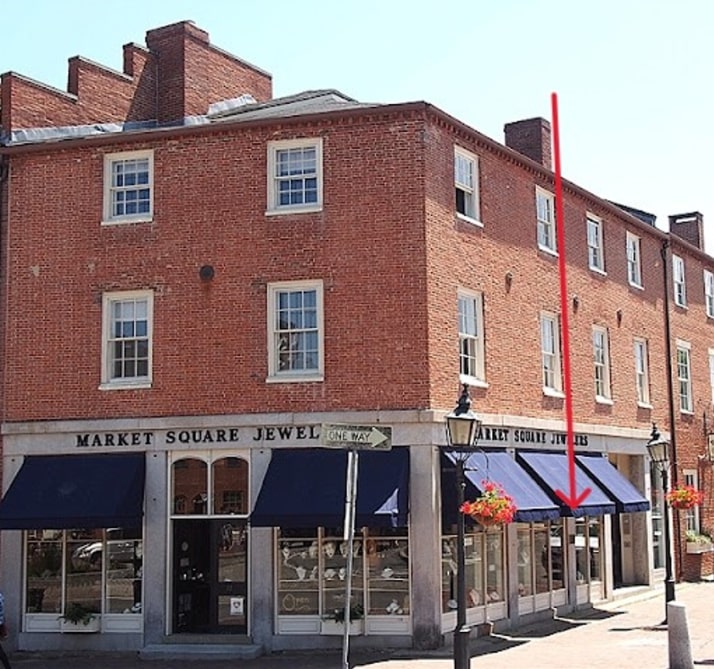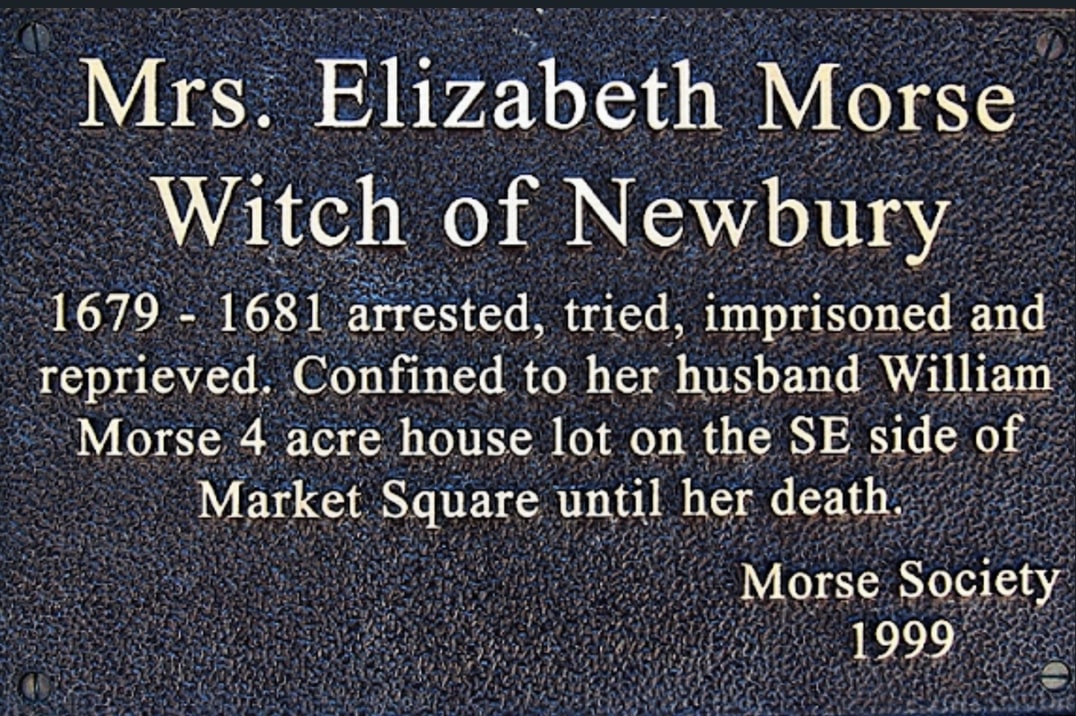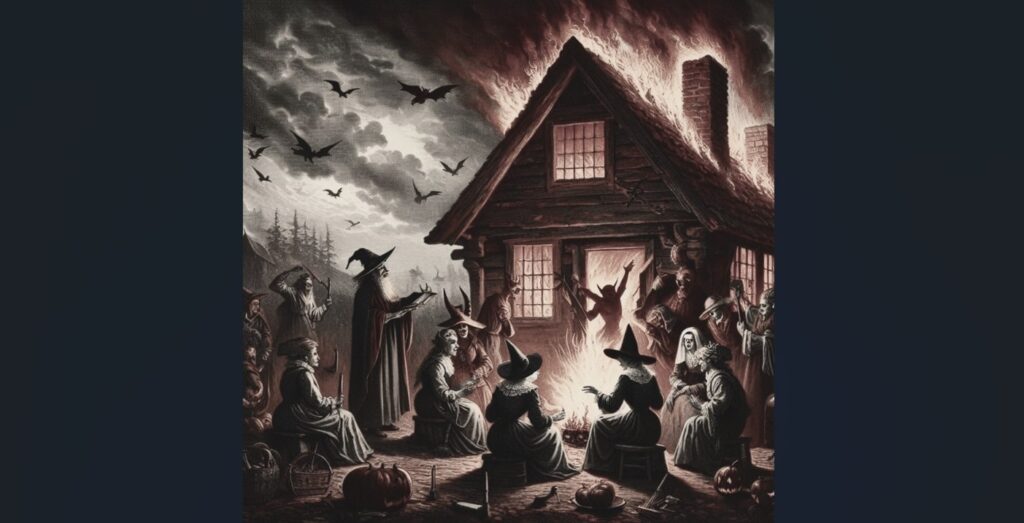Introduction: In this article, with Halloween approaching, Melissa Davenport Berry writes about an accused witch in Newbury in 1679, 13 years before the Salem witch trials. Melissa is a genealogist who has a website, americana-archives.com, and a Facebook group, New England Family Genealogy and History.
Old Newbury, Massachusetts, had its share of spectral sensation way before the infamous Salem witch trials of 1692. The home of Elizabeth “Goody” Morse was the scene of an evil presence which led to a conviction of witchcraft and a near execution.
In 1679 the home of cobbler William Morse and his wife Elizabeth was the center of a rogue evil possession cooked up by their own grandson John Stiles, who mimicked the “lithobolia” (“stone-throwing devil”) attacks that are well documented by Emerson Baker in The Devil of Great Island: Witchcraft and Conflict in Early New England.
The story begins with a certain neighbor named Caleb Powell, who was initially blamed for working with the devil and molesting William Morse and his family. Powell, who knew the real perpetrator was Stiles, claimed he could help Morse find the culprit creating the devil’s work – but his good intentions got him fingered. Many of the Newbury residents testified against Powell, including William Morse.
When Powell was acquitted, Goody Morse became the target and was charged, convicted, and ordered to be executed. She managed to get out alive, but not without a grueling year of jail time and severe hardship.
This unfortunate drama was just a preview to the tragic events of the 1692 Salem witch hunt in which many did lose their lives.
Here is a photo of the location where the Morse home once stood, now the Market Square Jewelers on the corner of State Street and Liberty Street in Newburyport, Massachusetts, courtesy of J. W. Ocker from his blog Odd Things I’ve Seen. The red arrow points to the historical marker on the exterior of that jewelry shop.

Below is an image of the historical plaque erected by the Morse Society.

A version of the story was published in a 1922 newspaper.
In telling this tale, I am using information from the newspaper article as well as court testimony from Records and Files of Quarterly Courts of Essex County and Records of the Court of Assistants of the Colony of the Massachusetts Bay 1630-1692, as well as David D. Hall’s Witch-Hunting in Seventeenth-Century New England: A Documentary History 1638-1693.
It is obvious to readers today that neither Powell nor Morse were guilty of being in league with the devil, but the belief in witchcraft was real in 17th century Massachusetts Bay Colony. In this case, the delusion and hysteria that set in came from the petty pranks of a little scamp who would not fess up.
As the article states:
…the case of Elizabeth Morse was the only recorded case of supposed witchcraft in Newburyport that was ever subjected to a legal investigation. And all because of a mischievous small boy who was Mrs. Morse’s grandson and who doubtless laughed in great glee over the worry he caused the fine old couple – until such time, perhaps, as he realized his grandmother was in danger of death.
Here is what is recorded in the court transcriptions (and mentioned in the article) describing testimony given against both Powell and Goody Morse.
Sarah Hale and Joseph Merrick testified that they overheard a boatswain who worked with Powell say that “if there were any wizards he was sure that Caleb Powell was one.”
William Morse, along with his wife, provided a lengthy testimony describing a night of great noises by an invisible force – knocking on wood, stones being thrown at the house, sticks coming from the chimney, and later in the night a loud noise on top of the roof. He claimed their grandson was present when the events happened, and John Tucker affirmed the same.
The Morses also described a great hog mysteriously appearing in their house – though the door had been locked when they went to bed, it was unlocked when they investigated the loud grunts in the middle of the night.
Morse further testified that the next morning a stick of links was jumping around and landing in the fire. And many stones, sticks, and bricks came down from the chimney. Andirons moved about the room. The objects flying about attacked him and often disrupted his prayers and writing. At one instance while praying a shoe hit his head.
Neighbors who visited the home testified the same. Stephen Greenleaf, Thomas Rogers and George Hardy testified and affirmed Morse’s statements and claimed they either witnessed and/or suffered attacks.
Anthony Morse, brother of William, testified he also witnessed strange events in the house. Benjamin Richardson claimed William Morse “yarled liked a cat and barked liked a dog.”
John Badger confirmed that he was present when Powell claimed he understood astrology and astronomy and could figure out the diabolical attacks by these means. To suspicious minds, this seemed like an admission by Powell that he was a wizard.
John Emerson and Elizabeth Titcomb confirmed Powell had knowledge of black arts.
Mary Tucker testified that Powell told her he knew that the little devil behind all the mischief was Morse’s grandson, and that he broke the enchantment.
When Powell was acquitted the town fingered Goody Morse. The testimony provided against her was quite colorful.
Goodwife Ann (Emery) Ordway testified that her child had long been ill, and that Mrs. Morse came in, looked at her child with pity, and said that she “did fear it would dy” – and not long after this the child did die. Thomas Knowlton affirmed this.
David Wheeler claimed Goody Morse bewitched his cattle and had a magic staff. He also said John Ordway witnessed one of his sheep drop dead.
Hesther Wilson testified that her mother Goodwife Chandler told her she was afraid of Goody Morse, and that she was a witch. Chandler, at the recommendation of Goody Morse, hung a horseshoe on her door to ward off evil. After that Morse never came to visit even when Daniel Rolfe encouraged her – but when William Moody ripped the witchy horseshoe off the door, Morse once again came a-calling.
And it goes on and on!
Stay tuned for the Wicked Warlock of Essex County!
Explore over 330 years of newspapers and historical records in GenealogyBank. Discover your family story! Start a 7-Day Free Trial
Note on the header image: the devil in Newbury. Credit: Melissa Davenport Berry.
Related Articles:
- How the Accused Were Pinned for Witchcraft in Salem 1692
- Relics of the Salem Witch Trials Era (part 1)
- Relics of the Salem Witch Trials Era (part 2)
- Relics of the Salem Witch Trials Era (part 3)
- Relics of the Salem Witch Trials Era (part 4)
- Relics of the Salem Witch Trials Era (part 5)
Another Source:
- Expose of Newburyport Eccentricities, Witches and Witchcraft by H. P. Davis.
